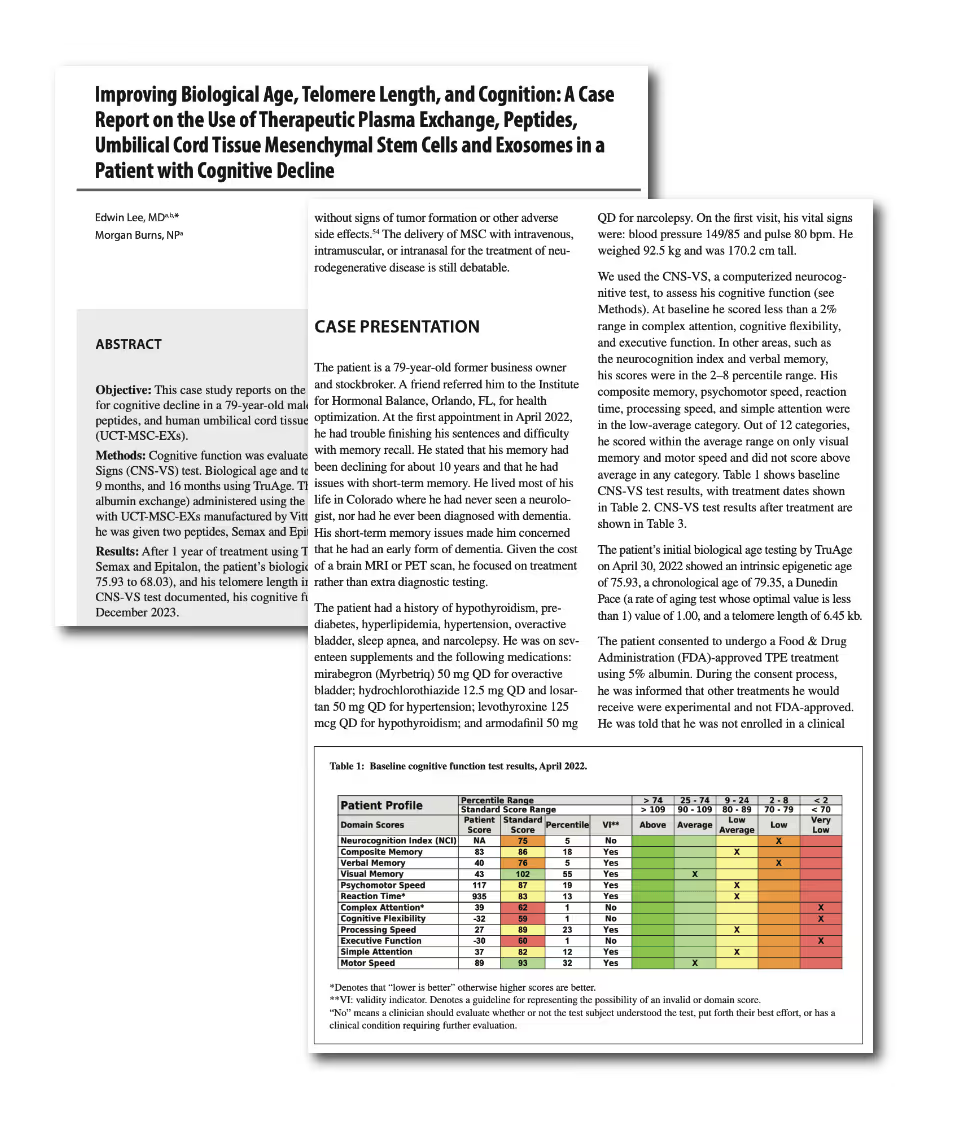Services
Contact Us
Connect with us either on the phone or email
JOIN AS A MEMBER
Ideal for those who have not had success in resolving symptoms by just eliminating gluten from their diet.

Therapeutic plasma exchange (TPE) is a cutting-edge medical service that refreshes the patient’s plasma (the liquid part of the blood) in order to remove particles that are known contributors to disease and accelerated aging.
Therapeutic Plasma Exchange at Next Health includes a Baseline Test and a Total Tox Burden Test before each session. This empowers you to monitor the impact of TPE on your health journey and maximize your results. Post session labs can be purchased at an additional cost.
Plasma is removed through an IV and centrifuge with the goal of extricating harmful substances such as proteins that cause plaque build-up, autoimmune conditions, arthritis, and even neurodegenerative disorders such as Alzheimer’s disease. Critical components such as red blood cells and immune cells are separated from the plasma and returned to the body for healthy functioning. The plasma itself is replaced with a saline, vitamin-packed solution to nourish the body. The purpose of this replacement therapy is to replace substances that aren't working properly in your body with ones that are more effective.
TPE is performed under the care of a licensed medical provider and monitored by healthcare professionals. The process will take about 2-4 hours, and can be done on an outpatient basis.
TPE has been used as part of treatment plans for Alzheimer’s disease, inflammatory conditions, chronic viral infections, kidney issues, and more by reducing the protein and harmful components in the body. Over time, these proteins have a compounding effect on the body that contributes to and worsen these conditions.Now, this service is available to those looking to take a proactive approach to their health as research shows TPE has promising benefits for those looking to live healthier and longer. By reducing and eliminating common contributors to disease with TPE, you are empowered to change the trajectory of your health for the better.
Therefore, this service is a great option for anyone aiming to enhance their longevity lifestyle and feel their healthiest. It can especially benefit individuals with:
Elevated lipoprotein (a) and other lipid levels
High levels of inflammation
Family history of neurodegenerative disorders like Dementia
Think of Therapeutic Plasma Exchange as an “oil change” for your blood. This cutting-edge medical procedure is designed to optimize your body’s performance, reduce systemic inflammation, slow the aging process, and support overall vitality.
After removal, beneficial components are added back into the body for a variety of potential results:
VIEW MEDICAL STUDIES
Have questions about if the Renew Package is right for you?
Request to speak to a Wellness Expert below who can answer any questions you may have:
At Next Health, we stand apart from traditional medical practices in several fundamental ways that prioritize your proactive health and wellness:
In conventional medicine, doctors often rely on "normal" lab results, which can sometimes be limited in providing a comprehensive view of your health. The concept of "normal" is based on the middle 95% of results, fitting within a typical bell-shaped curve. This means that even if you fall from the top 90% to the bottom 10% for a particular marker, it could still be considered "normal." At Next Health, we take a different approach. Our Functional Medicine Experts understand that what's optimal for you might differ from a generalized "normal." We utilize a unique reference range to assess your optimization, aiming for your best possible health.
Studies published in prestigious medical journals, including the Annals of Internal Medicine and the Journal of the American Medical Association, have shown that physicians can lag behind the latest research by an average of 17 years. At Next Health, we're committed to breaking that cycle. We bring you to the forefront of health optimization by offering cutting-edge medical services that are backed by the latest scientific advancements. This means you receive care that is current, effective, and aligned with the most up-to-date research available.
The average American spends a mere 20 minutes with their primary care provider annually, leaving minimal room for exploring the intricacies of your individual health needs. Recognizing that every individual's health journey is unique, we take a personalized approach at Next Health. We understand that your body, history, and goals are distinct, and we tailor a health optimization plan that best suits your specific needs. Our aim is to guide you toward the best possible results based on your individual circumstances.






The Wheat Zoomer is a peptide-level test with the most robust panel available for the detection of intestinal permeability, gluten and wheat sensitivity, celiac disease, and gluten-mediated autoimmunity.
A wheat sensitivity can severely compromise the health of your gut as it can inflame the gut lining.
Inflammation of the gut can quickly lead to a wide-range of symptoms including brain fog, joint pain, skin problems, and more.
Analysis of the following:

This test is not recommended for someone who already knows they have a challenge with gluten.
However, the Wheat Zoomer analyzes more than just gluten and wheat antigens, it will also yield helpful data in regards to the health of your gut, specifically, if you are dealing with intestinal permeability (leaky gut syndrome).
VIEW SAMPLE REPORT
.jpg)
.jpg)
This test is not recommended for someone who already knows they have a challenge with gluten.
However, the Wheat Zoomer analyzes more than just gluten and wheat antigens, it will also yield helpful data in regards to the health of your gut, specifically, if you are dealing with intestinal permeability (leaky gut syndrome).
VIEW SAMPLE REPORT
Experts estimate that between 30-50% of the population are sensitive to gluten and grains and many do not even know it.
Moreover, an estimated 15-20% of people with celiac disease have no GI symptoms. However, if you have celiac disease, you may still not be absorbing nutrients effectively, worsening the condition and increasing the chance of developing an autoimmune disease. That is why we always recommend the Wheat Zoomer proactively, to ensure there are no underlying issues compromising your longevity.


Experts estimate that between 30-50% of the population are sensitive to gluten and grains and many do not even know it.
Moreover, an estimated 15-20% of people with celiac disease have no GI symptoms. However, if you have celiac disease, you may still not be absorbing nutrients effectively, worsening the condition and increasing the chance of developing an autoimmune disease. That is why we always recommend the Wheat Zoomer proactively, to ensure there are no underlying issues compromising your longevity.
.jpg)
This test is not recommended for someone who already knows they have a challenge with gluten.
However, the Wheat Zoomer analyzes more than just gluten and wheat antigens, it will also yield helpful data in regards to the health of your gut, specifically, if you are dealing with intestinal permeability (leaky gut syndrome).
VIEW SAMPLE REPORT

Experts estimate that between 30-50% of the population are sensitive to gluten and grains and many do not even know it.
Moreover, an estimated 15-20% of people with celiac disease have no GI symptoms. However, if you have celiac disease, you may still not be absorbing nutrients effectively, worsening the condition and increasing the chance of developing an autoimmune disease. That is why we always recommend the Wheat Zoomer proactively, to ensure there are no underlying issues compromising your longevity.
From all of our Baseline Tests collected over the years, we’ve compiled results from 100 individuals. As indicated by the below graphs, the majority of participants unknowingly had suboptimal levels, but are still considered “healthy” by conventional standards.
At Next Health, we look for optimal levels and value the incremental 1% improvements in your data over time. These seemingly small enhancements can accumulate to create a substantial difference in your overall well-being for lasting vitality and longevity.







At Next Health, we stand apart from traditional medical practices in several fundamental ways that prioritize your proactive health and wellness:
This is why you can trust Next Health as your premier provider. We're not just about normalizing; we're dedicated to optimizing your health. Our commitment to being 17 years ahead in medical research ensures that we're at the forefront of advancements, and we bring you along with us on a journey to live healthier and longer. With a streamlined and simplified approach, we prioritize science-backed methods and tailor them to your unique needs, making Next Health a trailblazer in proactive, individualized health and wellness care.
No, fasting is not required for this test.




